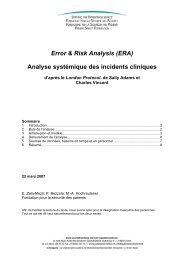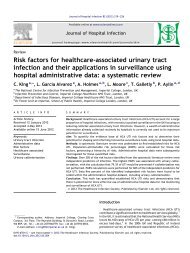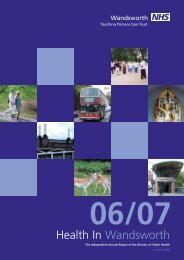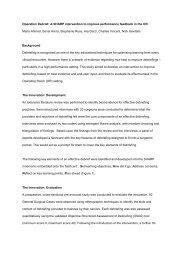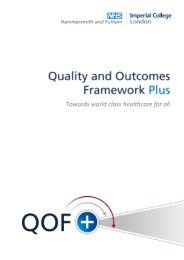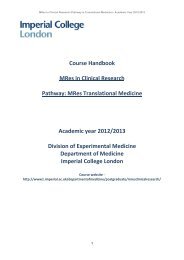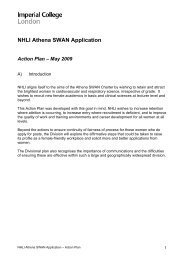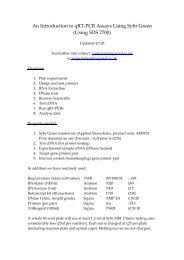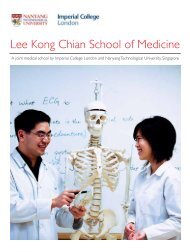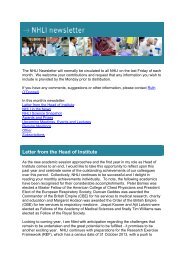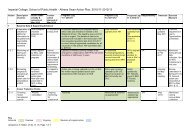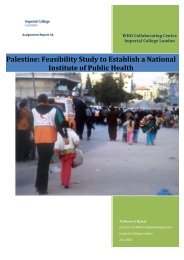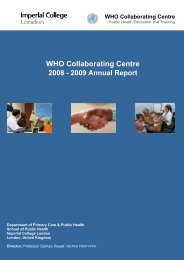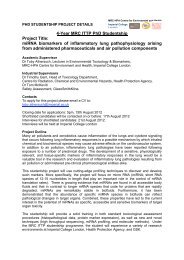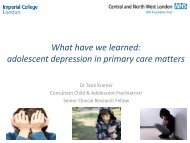APPLICANT - Imperial College London
APPLICANT - Imperial College London
APPLICANT - Imperial College London
You also want an ePaper? Increase the reach of your titles
YUMPU automatically turns print PDFs into web optimized ePapers that Google loves.
The ideal objective for the trainee to succeed and have a true experience of research is for<br />
the trainee to experience all phases of research. All these phases are unlikely to be<br />
completed in a single project in a four month period. It is therefore important for each trainee<br />
to identify learning opportunities for each of these phases below within their foundation<br />
training. Thus the advantage of the unlinked academic foundation post is vast and also<br />
allows each trainee to tailor their academic period. Therefore it is beholden on each trainee<br />
to complete their academic training with supervision.<br />
Each trainee will have an educational supervisor for the whole year (Mr Yuen Soon, Prof<br />
David Russell Jones, Dr Charles Godden) and a research supervisor who will be identified<br />
in their F1 year who will be responsible for direct research supervision. Each F2 will also<br />
have a clinical supervisor who is responsible for their clinical supervision during their<br />
academic four months.<br />
Each trainee will be allowed to select a speciality to be attached to during their academic<br />
four months. During the four months each trainee will be supernumerary to the service<br />
requirements of the firm but will be required to contribute to two clinical sessions of the firm.<br />
These firms are to address clinical skills to develop same educational competencies as F2 in<br />
non academic posts. These firms will be at the Royal Surrey. There will be no exceptions.<br />
All research projects will be developed in conjunction with research supervisors. Research<br />
plans, methodology and protocols should be in place prior to commencing the academic four<br />
months. All efforts to facilitate this will be given by the educational centre. Research outside<br />
the trust will only be agreed if discussed with educational supervisors and FTPD. All steps<br />
must be taken to ensure sufficient mentoring by research supervisors if research is to be<br />
undertaken outside the trust.<br />
During the year all trainees will be expected to attend a research methodology and statistic<br />
course. This will be budgeted out of the education centre.<br />
It is hoped that each trainee will contribute sufficiently to each project so as to be included in<br />
each paper but also to have themselves written and submitted at least a poster to a national<br />
meeting.<br />
At the end of the attachment each trainee will be expected to write a reflective practice of<br />
their four months of academia addressing all the phases of research as detailed above.<br />
All academic F2 will be expected to complete the same competencies as non academic F2<br />
to achieve F2 competencies to be signed of. There will be no exceptions.<br />
In Summary each Trainee will need to:-<br />
• 6 Mini CEX<br />
• 6 CDB<br />
• 6 DOPS<br />
• Attend F2 teaching at RSCH (70%)<br />
• Reflective practice on all research phases<br />
• Present at a National Meeting or “Communicate” their research project to foundation<br />
Faculty group meeting.<br />
• reflective practice on the 2 ethical Committee Meetings attended<br />
• Attend a statistical and research methodology course.<br />
www.stfs.org.uk/student/academic-programmes<br />
Email: tfsacademicrecruitment@stfs.org.uk<br />
Page 60 of 70<br />
Updated: 27 May 2010



